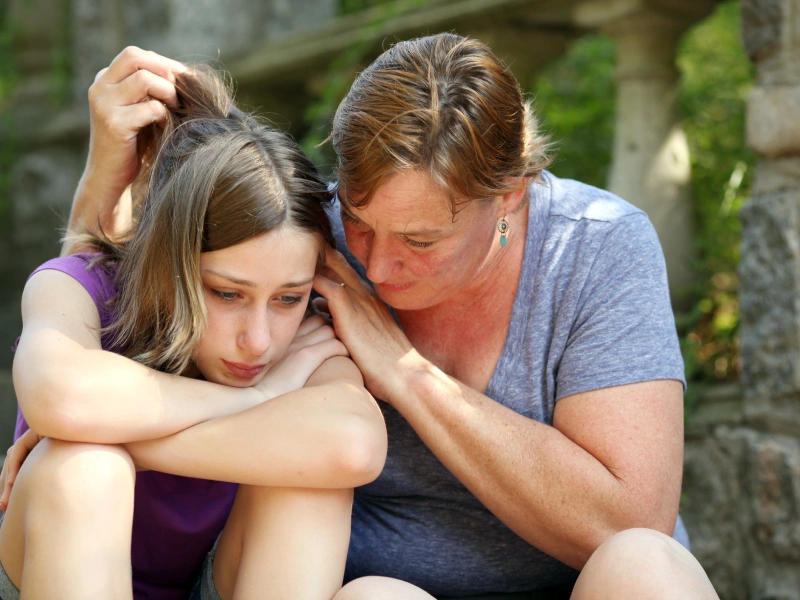
Table of Contents
What is Ancestral Trauma?

Written By: Ashley Laderer

Clinically Reviewed By: Dr. Don Gasparini
January 26, 2023
8 min.
It’s possible to feel the effects of trauma even without living through a traumatic event yourself. Enter: ancestral trauma. Here’s what you need to know about it.
Learn more about our Clinical Review Process
Table of Contents
When you think about genetics and inherited traits, you probably think about things like hair color, eye color, and skin color. But did you know that trauma, in a sense, can be inherited, too? This is known as ancestral trauma, also referred to as intergenerational or generational trauma.
All of these phrases refer to inherited trauma –– trauma that someone may feel although they did not experience it themselves firsthand.
It might be simple to understand the concept of having a trauma response to a traumatic event that happened directly to you during your lifetime. But it can be a bit more difficult to grasp the fact that even if you haven’t experienced trauma yourself, the trauma that your ancestors endured can have an effect on your life.
If you feel like you have symptoms related to trauma without being a trauma survivor yourself, read on.
What is ancestral trauma or intergenerational trauma?
Unlike some trauma-related mental health conditions like post traumatic stress disorder (PTSD) or acute stress disorder (ASD), ancestral trauma is not a formal diagnosis. However, the body of research surrounding ancestral trauma is growing, and we are learning more and more about it –– showing us that the impact of intergenerational trauma is serious.
So, can you inherit trauma from your ancestors? Long story short, yes.
Essentially, the concept is that you can feel the impact and effects of trauma even if you did not personally experience it. So, if your parents or ancestors lived through traumatic events, that means you could personally still feel the repercussions of that family trauma.
While the ramifications of generational trauma have been around for, well, generations, the term itself didn’t gain traction until 1966, when a psychiatrist named Dr. Vivian M. Rakoff published a study about the mental health of the offspring of Holocaust survivors, noting profound negative mental health effects on the children even though they themselves were not part of the Holocaust. Since then, further studies have been conducted looking into other groups of people who might be more prone to experience ancestral trauma. There are plenty of families out there who could be dealing with intergenerational trauma without being aware of it.
Ancestral trauma can be attributed to both internal and external factors –– internal factors meaning genetics and external factors meaning environments, behaviors, or situations someone was subjected to.
Genetically, understanding ancestral trauma is linked to an area of research known as epigenetics, which studies how people’s environments and behaviors can affect and change how their genes work. The changes affect what is known as “gene expression” rather than the actual DNA sequences. Nonetheless, these changes can be passed on from one generation to another. This is known as epigenetic inheritance. Research in this field is growing and epigenetics experts are working to learn more about exactly how and when these changes occur.
Join the Charlie Health Library
Get mental health updates, research, insights, and resources directly to your inbox.
You can unsubscribe anytime.
When it comes to external factors, there may be learned behaviors that become status quo within a family. One example of this is intergenerational abuse where a cycle of abuse continues from one generation to the next. For instance, perhaps a woman was abused as a child, and then she went on to abuse her child when she had a kid, and so on. In less severe situations, there might be some examples of behaviors that are passed down – such as if a man was taught by his father that men should not show emotions and that people shouldn’t talk about their feelings, and then this man could pass along the same mentality to his kids, and they could pass it along to their kids.
Ancestral trauma can be due to many different scenarios, and everybody is unique –– but there’s no denying that family trauma and unhealthy behaviors in families can impact you.
What are some causes of ancestral trauma?
In some situations, if you know your cultural and family history, there can be some pretty clear hints that your family could be dealing with some ancestral trauma.
One of the most well-researched examples of ancestral trauma is regarding Holocaust survivors and their families. Aside from the Holocaust, other major historical events that have been studied and shown to result in intergenerational trauma include The Holodomor (or “great famine”) in Ukraine and The Civil War.
Major oppression and discrimination, and marginalization in general can also result in intergenerational trauma. This is common in certain groups who experienced collective trauma such as:
- Native American people who have ancestors who were affected by the tragic deaths associated with colonization and the implementation of “American Indian residential schools.”
- African American people who have ancestors who were victims of slavery, violence, and ongoing racial discrimination.
- Asian American people who have ancestors who were refugees and/or exposed to genocides or wars.
- Latin American people who have ancestors who were subjected to colonization, violence, and stressors related to migration.
In these cases, it may be obvious that your ancestors faced these ongoing and tragic struggles that can still affect you and your family today, hinting at the presence of intergenerational trauma.
Outside of historical events, oppression, and discrimination, some more personal traumatic events such as adverse childhood experiences (ACEs) can also lead to inherited trauma for offspring. Several examples of ACEs are:
- Being a victim of abuse, neglect, or violence
- Witnessing violence
- Living in a household where a family member abuses substances such as alcohol or drugs
- Living in a household where a family member has mental health problems
- Losing access to a parent due to separation
- Losing access to a family member who is in prison or jail
- Having a family member who attempts suicide or dies by suicide
Depending on how open your family members like your parents or grandparents are about their past and childhood trauma, you may or may not be aware that any of these traumatic events took place. Sadly, though, ACEs are very common. The CDC reports that 61% of adults say they experienced at least one adverse childhood experience growing up. Of these respondents, one-sixth of them said they experienced at least four ACEs.
Traumatic experiences in childhood aren’t the only contributing factors. Trauma later in life can still play a role in intergenerational trauma.

How do you know if you personally are affected by ancestral trauma?
Ancestral trauma does not necessarily have a specific set of symptoms, since it is not a diagnosis. However, people affected by ancestral trauma may experience symptoms related to trauma responses or symptoms similar to PTSD symptoms. Some examples of trauma-related symptoms include:
- Feeling emotions like anger, guilt, sadness, or shame
- Feeling hopeless or numb
- Experiencing feelings of anxiety or depression
- Having otherwise unexplained physical symptoms like headaches, fatigue, or nausea
- Hyperarousal or being easily startled
- Wanting to withdraw or isolate from loved ones
- Having difficulty concentrating
- Having trouble sleeping
However, unlike people who have lived through a traumatic event firsthand, people experiencing intergenerational trauma may not experience PTSD symptoms such as distressing memories about the specific events or intense vivid flashbacks.
Additionally, research shows that among people who experience ancestral trauma, there are higher rates of mental health conditions such as:
- Generalized anxiety disorder
- Depression
- Post traumatic stress disorder (PTSD)
- Substance use disorder
If you experience a combination of any of these symptoms and/or have one of the above mental health conditions, it is possible that ancestral trauma may be to blame –– or at the very least, it could be a contributing factor as to why you feel the way you do. By understanding the connection between ancestral trauma and your present-day symptoms, you can take the reins on having a better understanding of the phenomenon, seek treatment for your own mental health symptoms, and work towards breaking generational trauma.
Do you need more support with
your mental health?
Charlie Health can help.
How do you break ancestral trauma?
While we certainly cannot take back traumatic events of the past and take away the pain that your parents, grandparents, and ancestors endured, you can make an active effort to break the cycle of ancestral trauma and improve the mental health experience for future generations to come.
There is not an easy quick fix or one-size-fits-all approach to breaking generational trauma. It will take ongoing active effort from you and other family members.
If you are a parent or caregiver who wants to stop the cycle and promote healing for the future generation, here are some things you can do:
- Ensure that open communication and healthy displays of emotions are encouraged in the family
- Work through your own personal unresolved trauma (such as any traumatic events linked to ACEs or later-in-life trauma) with a trauma-informed therapist, and encourage other caregivers to do so, as well
- Work through your own mental health struggles, and encourage other caregivers to seek help too
- Identify unhealthy behaviors or communication patterns that have been ongoing in your family
- Educate yourself and your family about ancestral trauma and how it can affect you and future generations
- Go to family therapy with your parents and/or children
If you believe the effects of ancestral trauma are harming you personally, it is so important to take care of yourself and seek help. By taking care of your own mental health and addressing your past trauma, you will improve your mental health and improve the chances of breaking the cycle of generational trauma. Even if you don’t plan on having children, you can still seek mental health treatment for any inherited trauma that is affecting your quality of life.
Seeing a mental health therapist can help you dive into your past and present, helping to better understand what could be the cause of your symptoms. From there, you can learn how to cope with your emotions in a healthy way, discover new ways of thinking, and even grow from trauma.
How can Charlie Health help?
Are you a teen or young adult experiencing troubling mental health symptoms? If so, ancestral trauma could be a contributing factor. Regardless of the cause of your symptoms, Charlie Health may be able to help.
Our personalized intensive outpatient program (IOP) offers mental health treatment for teens, young adults, and families who are dealing with a variety of mental health struggles, including trauma, anxiety, depression, and more.
In our program, you will get matched with a therapist who meets your personal needs, and get connected with a group of peers who face similar struggles to help you remember you are not alone.
Coping with ancestral trauma and any other mental health conditions can be difficult, but with treatment, you can push forward, feel better, and work towards breaking ancestral trauma. Get started on your healing journey now.
References
https://www.cdc.gov/genomics/disease/epigenetics.htm#
https://www.genome.gov/genetics-glossary/Epigenetics
https://www.childwelfare.gov/topics/safety-and-risk/impacts-abuse-and-neglect/
https://www.apa.org/monitor/2019/02/legacy-trauma
https://www.psychiatry.org/News-room/APA-Blogs/How-Historical-Trauma-Impacts-Native-Americans
https://iuhealth.org/thrive/generational-trauma-breaking-the-cycle-of-adverse-childhood-experiences





